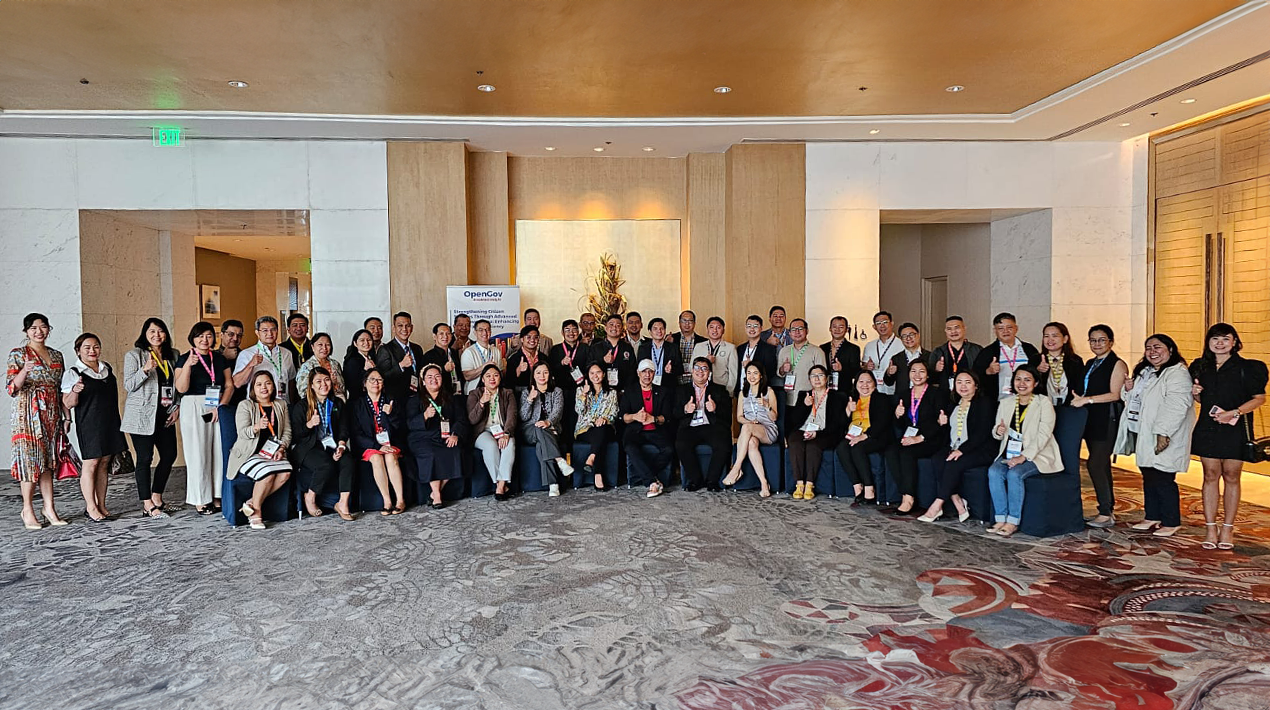
|
Getting your Trinity Audio player ready...
|
Governments across the world are utilising the potential of data to enhance citizen services in an increasingly digital age. Just like many other countries with a rapidly expanding population and a wide spectrum of demands, the Philippines faces the challenge of an evolving nation.
To enhance citizen services, the Philippine government is embarking on a path of advanced data governance, aiming to improve efficiency while safeguarding individual privacy.
In recent times, the Philippines has undergone a significant digital transformation, aiming to deliver efficient public services in a nation with a population exceeding 113 million. This challenge also presents a substantial opportunity to leverage data for innovation across sectors like healthcare, education, transportation, and public safety.
Central to this digital revolution is advanced data governance, encompassing the collection, management, security, and utilisation of data to ensure its integrity and reliability. Implementing such practices holds the potential to yield numerous benefits for the citizens of the Philippines.
Advanced data governance enables the provision of personalised citizen services. By analysing data on citizen preferences, needs, and behaviours, the government can tailor its services to cater to individual demands. This customisation enhances the effectiveness of government initiatives while elevating the overall citizen experience.
In healthcare, as an example, comprehensive patient medical histories empower medical professionals to make informed choices, leading to improved patient outcomes based on past diagnoses, treatments, and test results.
Enhancing government operational efficiency stands out as another key benefit of advanced data governance. With access to accurate data, governmental entities can make informed decisions, allocate resources efficiently, and streamline processes.
While data-driven governance offers numerous benefits, safeguarding citizens’ privacy remains a paramount concern. Building and maintaining trust between the government and citizens is imperative for the success of any data governance initiative.
Despite the Philippines’ strides in data governance, challenges persist. Data silos within different government agencies can impede effective data utilisation. To overcome this, establishing interoperability and data-sharing protocols becomes essential.
Staff capacity and skills also directly impact success. A proficient team specialising in data management and analysis is crucial, alongside funding programmes for capacity-building and training to unlock the full potential of data.
The OpenGov Breakfast Insight held on 15 September 2023 at the Shangri-La The Fort Manila discussed advanced data governance and robust data management solutions to help improve the citizen experience attended by the decision-makers from the Philippines’ public sector.
Opening Remarks

Amid the rapid development of the digital landscape, the utilisation of data has emerged as a critical element within contemporary government operations. In the Philippines, public sector agencies, too, are increasingly embracing digital platforms to enhance operational efficiency, optimise public service delivery, and inform their decision-making processes through data-driven insights.
Mohit Sagar, CEO & Editor-in-Chief of OpenGov Asia, emphasises the significance of data by likening it to the concept of oil in the past. Much like oil served as a vital resource that fueled economies in earlier times, data has now transformed into an invaluable asset that fuels innovation, guides decision-making processes, and shapes the industries of today.
With the ever-increasing integration of data into the realms of governance and public services, the need for more advanced data governance strategies becomes imperative. Embracing cutting-edge data management solutions and upholding stringent privacy standards empowers public agencies to establish a robust and trustworthy foundation for their data management practices.
“The public sector must continue to be able to accelerate the use of data to create public satisfaction to provide good public services,” Mohit believes. “This, ultimately, enables them to fully exploit the potential of data-driven insights, make informed decisions, and create an innovative and efficient environment in delivering essential services to society.”
In a data-centric world, one of the paramount challenges demanding attention is the safeguarding of data privacy and security. In an era marked by the exponential expansion of data and its pervasive use, the preservation of data privacy has risen to the forefront as a matter of utmost importance. The landscape of data security threats, encompassing intricate cyber hacking and privacy breaches, has grown progressively intricate, posing potentially catastrophic consequences for both individuals and organisations.
A growing recognition of the pivotal role played by data privacy has spurred companies, organisations, and governments into action, prompting them to proactively address the risks associated with data security.
Consequently, there is an urgent call for strong efforts to craft resilient security systems, implement stringent privacy protocols and enforce regulatory measures effectively. These measures are essential for safeguarding personal data and upholding the sanctity of sensitive information, ensuring their continued safety and security.
Mohit reiterates the likelihood of the Philippine government encountering various challenges in data management. These challenges encompass issues such as conflicting data guidelines and protocols for gathering, storing and using data.
Furthermore, data entry errors pose a significant challenge, as inaccurate, incorrect, outdated or incomplete data can result in ill-advised decisions and have a direct impact on the efficient delivery of public services.
“The presence of inconsistent data standards can introduce complexity when combining data from diverse sources. Consequently, this can impede the government’s capacity to perform thorough data analysis and derive comprehensive insights,” he says.
Given the increasing significance of the challenges related to establishing clear roles, responsibilities, and processes for efficient data management, Mohit recommends that the Philippine government seriously consider the adoption of advanced data management solutions.
“In an era where data is becoming an increasingly valuable asset, clear and structured regulations regarding data management are essential to maintain the security, sustainability and effectiveness of public services,” Mohit concludes.
Welcome Address

Embracing digitalisation presents a pivotal opportunity for the Philippines, with the potential to yield substantial benefits and maintain the nation’s competitiveness in a rapidly evolving global context. This digital revolution has the power to bring about transformative changes across sectors, positioning the country strategically to navigate an intricate and dynamic world.
Joseph Lluisma, Country Director of Qlik in the Philippines, highlights enhanced efficiency as a key advantage of digitalisation. By streamlining processes, reducing manual tasks, and addressing bureaucratic bottlenecks, advanced technologies can optimise government operations.
This optimisation leads to more responsive, cost-effective administrative functions, automating tasks that once involved extensive paperwork and time-consuming efforts, thus expediting decision-making processes.
“Moreover, digitalisation guarantees broader access to information and services,” Joseph emphasises. “In a globally interconnected digital landscape, geographical boundaries no longer impede the availability of crucial information and essential services.”
Digital platforms enable the distribution of vital information, public services, and educational materials to citizens regardless of their location. This narrowing of the gap between urban and rural areas empowers previously underserved communities, contributing to a more inclusive and well-informed society.
The capacity to spur economic growth is yet another compelling facet of digitalisation. The digital economy wields considerable influence in propelling economic prosperity. Through nurturing a robust environment for tech startups, fostering digital entrepreneurship, and promoting innovation, the Philippines stands to open new pathways for job opportunities and economic progress. Digital sectors, including software development and e-commerce, have the potential to become foundational pillars of the country’s economy.
Digitalisation empowers the Philippines to maintain and enhance its competitiveness. In an era where businesses rely heavily on digital tools, the capacity to adapt and leverage technology becomes essential. The adoption of digitalisation allows Philippine businesses to position themselves for competitiveness in both local and international markets. This transition not only drives innovation but also elevates customer engagement and improves operational efficiency.
According to Joseph, data represents the lifeblood of the contemporary business environment. In a world saturated with information, the skill to harness data proficiently stands as the critical factor distinguishing between success and stagnation.
He further noted that the Philippines, with its dynamic economy and varied industries, is on the brink of a data revolution, and Qlik aims to empower organisations across sectors to fully unleash the potential of their data.
“Our commitment to empowering data-driven decision-making goes hand in hand with our dedication to making a positive impact on society,” Joseph confirms.
Recent events, including the persisting effects of the pandemic, have highlighted the pivotal importance of data in healthcare, disaster response, and societal resilience. Qlik Philippines is positioned to drive transformative change by enabling data-driven solutions that tackle intricate issues and enhance the well-being of its citizens. They are committed to tailoring the solutions to drive meaningful and impactful outcomes.
“Central to our mission is the unwavering commitment to delivering exceptional value to our clients. We recognise that each client has unique needs and challenges,” Joseph furthers. “Customer-centricity is embedded in our DNA, and we are dedicated to exceeding our clients’ expectations.”
In Conversation With

In a rapidly evolving technological landscape, the Philippines is witnessing a significant transformation in its public service sector. Dr Enrico Paringit, the Executive Director of the Department of Science and Technology at the Philippine Council for Industrial, Energy, and Emerging Technology Research and Development (DOST-PCIEERD), underscores the profound impact of technological evolution on public service delivery.
Swift and extensive technological progress has brought about profound changes in the manner in which public services are both provided and accessed. The introduction of cutting-edge technology has inaugurated a period characterised by smooth and effective interactions, dispelling any worries about data accessibility and impartiality for these institutions.
In this current technological environment, government agencies and private sector entities have gained the ability to effortlessly and impartially navigate the terrain of data acquisition and utilisation. The convergence of cutting-edge technology is reshaping how government agencies and private sector entities interact with data, leading to more efficient, transparent, and accountable public services.
“This transformative shift not only simplifies processes, but also paves the way for more transparent, efficient, and accountable public services, benefiting Filipinos and driving the nation’s progress in the digital era,” says Dr Enrico.
A compelling illustration of the importance of satisfaction and experience is evident in the priority the private sector places on gathering feedback and input from their customers. The intentional and consistent manner in which organisations actively seek involvement and advice from clients is telling.
In the realm of public services and government, this approach holds true as well. By actively heeding the input from the public and stakeholders, the government can shape policies that are more adaptive and pertinent. The data derived from surveys and community feedback serves as a foundational resource for enhancing services, devising programmes and advancing policy planning.
One of the most effective strategies to accomplish this goal involves attentively listening to customer feedback through surveys and meticulous interviews. These mechanisms enable agencies to gather a diverse range of user perspectives and preferences. Subsequently, the data gleaned from these surveys can be methodically processed and transformed into structured, invaluable insights.
This data, in the shape of enhanced perceptions of the needs and expectations of citizens, proves to be a valuable asset for informed decision-making. Through a thorough analysis of this data, executives can craft more effective policies and strategies, aiming not only to meet but also to surpass expectations.
“Just like what PCIEERD did, we utilise this data to make decisions based on a deep understanding of the community to meet their expectations,” Dr Enrico elaborates. “Most importantly, this agency sees customer satisfaction as a continuous journey, not an end goal.”

Within the banking sector, Des Ong, serving as the Data Protection Officer and AI & Data Governance Head at UnionDigital Bank Inc., acknowledges the pivotal role that data assumes in the realm of finance and banking. With structured data, stakeholders within this industry possess the means to make objective and streamlined decisions, ultimately enhancing the well-being of both customers and employees.
“One of the other main benefits of integrated data is the ability to perform a more accurate risk analysis. With integrated data, financial institutions can better identify and manage credit, investment, and operational risks,” Des Ong explains.” They can track their portfolio performance more efficiently, assist in making informed investment decisions, and reduce the possibility of unexpected losses.”
Integrated data assumes immense significance within the finance and banking sector because it equips banks with the tools to elevate customer service. The integration of data grants access to a customer’s complete transaction history and their individual preferences. This, in turn, empowers banks to provide more personalised and tailored products and services, enhancing the overall customer experience.
Des Ong agrees that data security stands as a paramount concern in the financial industry. She places a strong emphasis on the role of data in enabling financial institutions to vigilantly monitor and safeguard customer data. Through data, these institutions can swiftly identify and respond to suspicious activities, including unauthorised access, thereby ensuring the protection of customer assets and preserving their privacy.
In addition, data integration brings about notable enhancements in operational efficiency within the banking sector. Banks can streamline their internal processes by leveraging integrated data, resulting in reduced costs and time expenditures for a range of administrative tasks. Additionally, this enhanced efficiency facilitates compliance with the rigorous reporting and auditing mandates imposed by regulatory agencies.
Integrated data not only improves operational efficiency and decision-making but also helps banks meet the stringent compliance demands imposed by supervisory and regulatory agencies. By having a well-integrated data system, banks can carry out their operations with confidence, comply with applicable regulations, and stay focused on providing the best service to their customers.
Compliance with regulations emerges as a pivotal facet of the financial and banking sector. In this contemporary age, financial oversight bodies and government regulations impose stringent standards on various facets of financial institution operations. These measures are designed to safeguard consumer interests, uphold the stability of financial markets, and deter detrimental practices.
Des Ong recognises that integrated data plays an immensely vital role in sustaining this elevated level of compliance. When data from diverse facets of a bank’s operations can be efficiently aggregated and centrally analysed, banks acquire a heightened capacity to monitor and assure adherence to all relevant requirements and standards. This empowers them to swiftly and accurately generate the requisite reports demanded by regulatory agencies, ensuring that no crucial details are overlooked and that they remain fully responsive to regulators’ needs.
Moreover, the capability to integrate data proves invaluable for banks when it comes to navigating the audit process. When independent supervisory bodies or auditors necessitate an examination of a bank’s operations, a bank equipped with integrated data can promptly furnish access to the necessary information. This streamlined approach renders the audit process significantly more efficient and effective, enabling banks to swiftly and efficiently respond to auditor requests, thereby ensuring transparency and regulatory compliance.
“And most importantly, for business continuity, through integrated data, we can also carry out in-depth market analysis. Data can better understand market trends and customer behaviour, which can help in designing more effective products and marketing strategies,” Des Ong shares.

Dennis Magsajo, in his capacity as the Head of Solutions Architects ASEAN Emerging Markets Worldwide Public-Sector ASEAN at Amazon Web Service, reaffirmed the paramount importance of data for the private sector. He emphasised that the fusion of personalised service experiences with data-driven insights empowers organisations to more effectively synchronise their strategies and offerings with the diverse and unique requirements of individuals.
Initially, through the analysis of data encompassing individual preferences, behaviours, and demographic information, organisations gain the capability to customise their services to precisely match the distinctive requirements of each segment of the population. This ensures that individuals receive services that are not only pertinent but also highly advantageous to them.
Data-driven insights also enable organisational entities to pinpoint specific population segments characterised by unique needs or challenges. This strategic awareness permits them to concentrate their efforts and allocate resources to areas where they can generate the most profound and meaningful impact.
“By utilising data, institutions can identify areas with resource underutilisation or overuse,” he explains. “Subsequently, they can redistribute resources to the areas where they are most required, ultimately boosting overall efficiency.”
Dennis reiterated that the implementation of contemporary data integration technology holds substantial promise for organisations seeking to surmount data silos and foster a culture of data sharing. This shift fosters the understanding that data is a valuable asset meant to be shared and leveraged for the collective benefit.
“By breaking down these information silos, institutions can access a wider and more diverse dataset, which is critical for comprehensive and informed decision-making,” Dennis is convinced.
Modern data integration tech facilitates the effortless collection and aggregation of data from various sources, including multiple departments within an agency, external partners, or other government entities.
Furthermore, it provides advanced data cleansing and transformation capabilities. This translates to the ability to standardise, clean, and harmonise data from diverse sources, making it compatible with one another.
Standardisation serves as a vital measure in mitigating the risks linked to the utilisation of inaccurate or incomplete data. By enforcing uniformity, it guarantees that the data employed for decision-making remains accurate, consistent, and reliable.
Dennis concludes that this cultural evolution engenders collaboration and transparency among various departments and agencies, culminating in an environment where data-driven decision-making becomes the prevailing norm.
Closing Remarks
Joseph appreciated the presence of the delegates, recognising their contributions and insights in the discussions of the day.
He acknowledges that the fundamental advantages of digitalisation lay the foundation for a transformative journey that holds the potential to shape the future of the Philippines. By embracing this digital revolution, the nation is positioned to solidify its global standing and usher in an era of advancement and innovation.
“The gains in efficiency, expanded access, economic growth, and heightened competitiveness resulting from digitalisation will pave the way for a more inclusive and prosperous society,” he is convinced.
He underscored that their mission is firmly rooted in constant innovation, as they continue to push the boundaries of data analytics and business intelligence. This endeavour is geared towards offering clients state-of-the-art tools and solutions that not only empower them to navigate a competitive landscape but also to excel and flourish within it. Innovation serves as the driving force behind their progress and stands as the foundation of their success.
Mohit’s perspective underscores the essential role of collaboration in nurturing sustainable growth and instigating positive change. By acknowledging that “collaboration lies at the heart of any approach”, combined efforts and shared expertise of various stakeholders will be instrumental in achieving meaningful outcomes.
Strong partnerships with all stakeholders and local communities are pivotal. These alliances will form the bedrock of the Philippines’ endeavours to cultivate innovation and drive progress.
In the context of an interconnected and rapidly evolving world, Mohit recognises that technological collaboration has emerged as a pivotal catalyst for innovation, progress, and achievement across various industries. Collaboratively developing and implementing technology yields a multitude of advantages for both individual organisations and the broader global community.
This collaborative approach acknowledges the interconnected nature of challenges and opportunities, recognising that no single entity possesses all the solutions. Instead, working collectively with a diverse range of partners, including organisations, government agencies, educational institutions, and local communities, allows for the pooling of resources, insights, and talents.
“In the tapestry of growth and change, partnerships form the intricate thread that weaves together sustainable progress,” Mohit concludes. “The synergy of technological collaboration stands as a beacon of innovation, propelling achievement across industry horizons, to a future where progress knows no limits.”
















